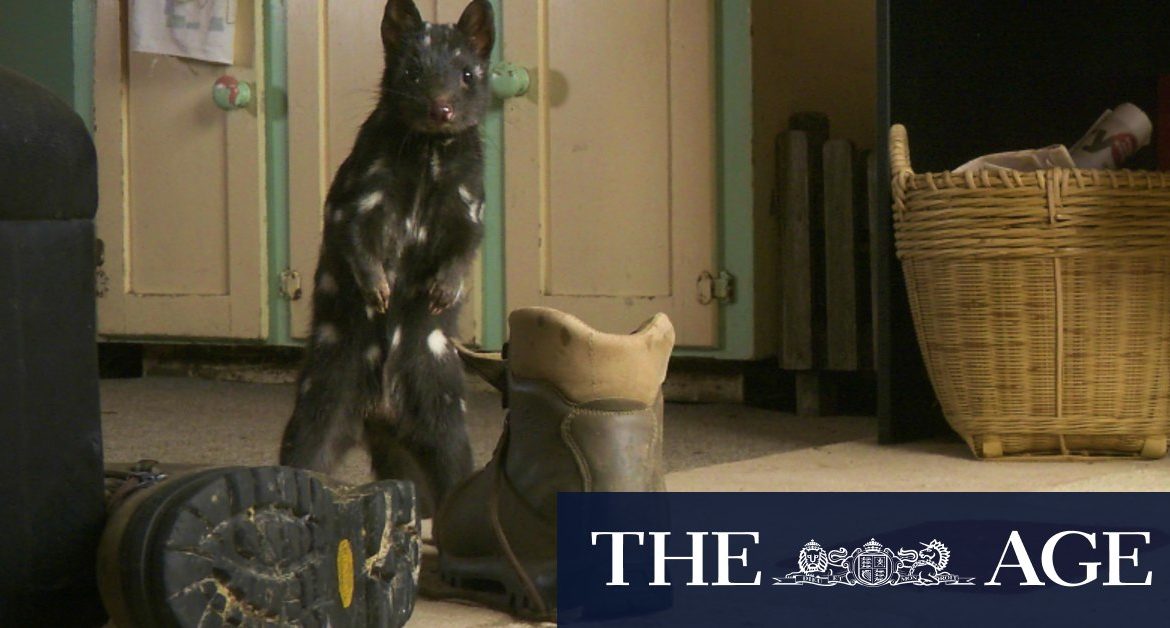“We wanted this film to be warm, but not completely fuzzy. We didn’t want to paint an unrealistic picture of what goes on out there,” Plowright says. “When I talk in the film about young quolls dispersing, the fact the quolls are disappearing on us really did concern me.”
The Eastern quoll is now extinct on the Australian mainland, while its numbers have decreased rapidly in Tasmania; the sharp drop in the population was apparent to Plowright from 2017, when he discovered the Quoll Farm site, to the end of shooting in 2020. Feral cats hunt the quolls, a situation that eventually moves Plowright to intervene, while the diminutive carnivores have a poor reputation with the state’s farmers that he believes is undeserved.
“Some wildlife films stage things … We didn’t have to do any of that. It’s 100 per cent genuine,” says Simon Plowright.Credit:ABC
“If you’re indifferent about quolls but have them on your farm, there’s absolutely no harm there. They’re actually doing you a whole lot of good,” Plowright says. “I’ve had some terrible things said to me at times: ‘the only good quoll is a dead quoll’. I’d like to be able to change some of those opinions, so I’m weaving little messages of hope through the film.”
Plowright’s speaking voice is the same as his narration: gentle with a touch of distant lilt. Now in his early sixties he was born and raised in Wales, where his parents were farmers. After they separated, his mother encouraged his childhood interest in wildlife, which only grew when he came to Tasmania in 1981 to work with his father in the state’s north-west and soon marvelled at the abundant biomass.
Over his four decades in Tasmania Plowright has worked in agriculture, led specialist tours and run a wildlife park, built and overseen a still thriving ecological consultancy, and assisted visiting nature documentary crews drawn to Tasmania’s unique flora and fauna. Moving from an expert guide to a cameraman, Plowright’s credits include David Attenborough’s Tasmania. Each gig steered him towards his own career as a filmmaker.

A scene from the ABC documentary, Quoll Farm.Credit:ABC
“Filming is my passion, but I came to animals first. You can be a good cameraman, but if you don’t know animals you won’t do so well,” Plowright says. “When you work for crews from overseas you end up advising them and holding the camera a lot of the time. It’s just the logical next step to doing it yourself, plus you see the errors people make and think, ‘I can do better than that’.”
With Tasmania cut off from international production teams, Plowright is making a documentary on the Tasmanian devil – another species that has suffered an alarming decline in numbers – for an international broadcaster. He believes that his documentary style, which weaves the rustic and delightful into a sense of involvement, can makes audiences care about subjects such as the quoll, which in turn encourages conservation efforts.
His own commitment includes trying to subsequently buy the property – whose remote valley location the documentary keeps undisclosed – where Quoll Farm was shot. His hope was that it could be a working farm, complete with the structures and debris that quolls use for dens. The land has been held in trust for a minor, but when he recently turned 21 the new owner refused Plowright’s purchase offer and instead opted to farm it himself.
“In the course of making the film I became attached to the place and the animals, but the people who took it over weren’t sympathetic to quolls, so I’ve been a reluctant to go back there,” Plowright says. “They haven’t seen the film yet. Hopefully it makes a difference.”
WHAT Quoll Farm
WHEN ABC, Sunday, February 14, 7.40pm
Craig Mathieson is a TV, film and music writer for The Age and The Sydney Morning Herald.
Most Viewed in Culture
Loading







